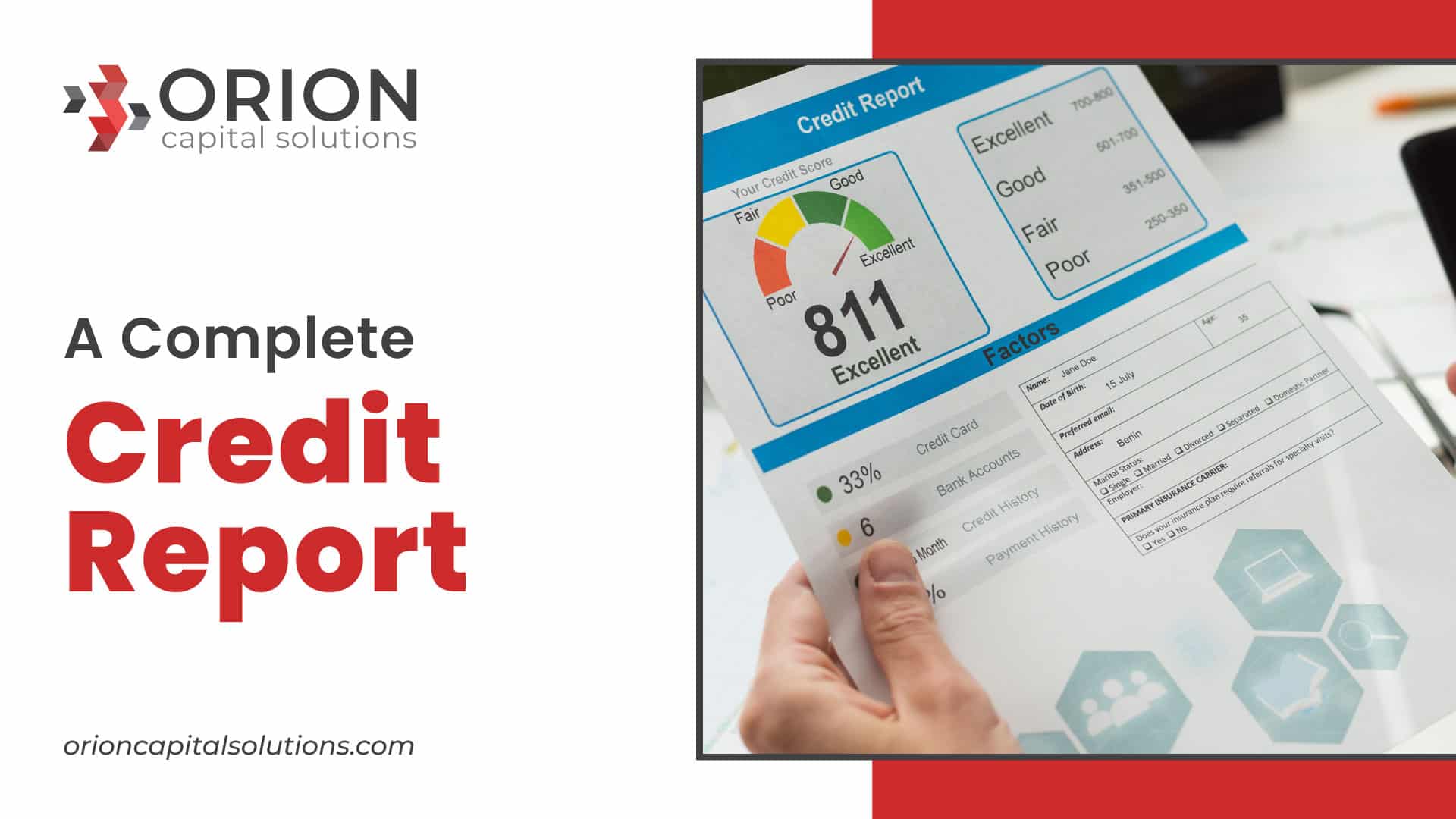The credit reporting system is at the center of both policy debates and practical lending challenges. Recent regulatory changes, court rulings, and evolving scoring models have drawn attention to what should be included in a credit report.
Orion Capital Solutions believes that the completeness of these reports, paired with accuracy, is essential to a healthy lending ecosystem. A “full-file” credit report provides a comprehensive view of a consumer’s financial history, helping lenders make informed decisions and giving consumers the chance to be evaluated on the full scope of their credit behavior.
What “Complete” Means in Credit Reporting
Complete credit reporting, often called “full-file” reporting, includes both positive and negative tradelines. This means not only recording late payments or defaults but also capturing on-time payments, active account statuses, and responsible utilization. Without these positive indicators, many borrowers (particularly those with limited credit history) are at a disadvantage.
Data from the Consumer Financial Protection Bureau (CFPB) shows that 87.5% of U.S. adults had a scored credit record in 2020, with only 2.7% considered “credit invisible.” These numbers reflect progress, but they also highlight the importance of ensuring all relevant, verified data makes it into the file.
Why Completeness Matters for Predictive Power
Credit reports are more than historical records; they are tools for predicting risk.
Lenders rely on them to distinguish between low- and high-risk borrowers quickly and accurately. When information is removed, whether certain account types or payment histories, the predictive strength of scoring models is weakened. This can lead to higher costs for borrowers, more manual verification for lenders, and fewer approvals for certain consumer segments. In a complete reporting environment, lenders can assess creditworthiness in seconds, enabling same-day approvals that would otherwise require days or weeks of manual checks.
The Consumer Benefits of Complete Credit Reports
A complete credit file ensures that positive behaviors count. On-time rent, utility, and telecom payments are particularly valuable for consumers who are “thin-file,” meaning they have few tradelines.
Research has shown measurable benefits. When DTE Energy began full-file reporting, 127,126 customers—about 6.2%—became scorable for the first time. Nicor Gas saw a nearly 20% reduction in delinquencies once customers were aware their payments were being reported, demonstrating that complete reporting can influence positive payment behavior. These examples show that completeness benefits not just lenders but consumers who gain recognition for responsible habits.
Current Policy and Regulatory Landscape
The definition of completeness is shaped by both industry practice and regulation.
In 2022 and 2023, major credit bureaus removed paid medical collections and collections under $500 from consumer reports. In January 2025, the CFPB finalized a rule to ban medical bills from credit reports entirely, but a federal court vacated that rule in July 2025, leaving medical debt reporting permissible under the Fair Credit Reporting Act.
While certain data types may be removed for consumer protection, the industry consensus remains that adding verified positive data is more effective for maintaining both fairness and predictive accuracy.
Real-World Examples of Expanding Completeness
The mortgage market offers strong proof of the benefits of additional positive data. Fannie Mae and Freddie Mac have both implemented programs to incorporate verified rent payment history into their automated underwriting systems.
Freddie Mac reports that more than 250 loan applications were upgraded from “Caution” to “Accept” after rent history was considered. Fannie Mae’s Positive Rent Payment programs—covering both single-family and multifamily properties—have been extended through mid-2025, showing clear commitment to integrating this type of data into mainstream credit evaluations.
The Bigger Picture – Completeness as a Driver of Economic Growth
A complete, accurate credit reporting system is not just a benefit to individual borrowers; it supports the economy as a whole. When more consumers are scorable, lenders can approve more loans with greater confidence, accelerating the flow of credit into the housing market, small business lending, and personal finance. Faster approvals mean consumers can act quickly on opportunities, and lenders can reduce operational costs tied to manual reviews.
Orion Capital Solutions’ Commitment to Data Integrity
At Orion Capital Solutions, we believe that complete credit reports are only valuable when the information they contain is accurate and responsibly furnished.
Our commitment is to uphold the highest standards of data integrity, ensuring that all relevant and verified information is reported in a way that supports both lender decision-making and consumer opportunity. By advocating for full-file reporting and participating in industry initiatives, we help maintain a credit system that is fair, transparent, and inclusive.
Building a Stronger Credit Ecosystem Through Completeness
The U.S. credit reporting system is one of the most advanced in the world, but its effectiveness depends on the completeness and accuracy of the data it contains. By preserving comprehensive records, adding verified positive information, and maintaining rigorous data standards, the credit ecosystem can continue to serve lenders, consumers, and the broader economy. Orion Capital Solutions remains committed to being part of that solution, working with industry partners, policymakers, and consumers to ensure that completeness supports both financial opportunity and responsible lending.


